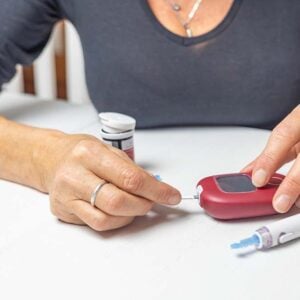
Sleep Link to Dementia REVEALED (NOT What You Think)
I have an exercise I’d like you to try. Or a “thought experiment,” as Einstein liked to call them.
The next time you’re with a group of seniors, look around. Visualize a big red letter “D” on the forehead of every third person. Now imagine all the marked people dying with some form of dementia.
What if I told you that the exercise was real?
Because statistically speaking, that’s exactly what will happen here in the real world – one out of every three folks will develop dementia.
It’s a terrifyingly high number. And with no cure in sight, all signs point to it worsening before it improves.
But it’s not all doom and gloom. There’s a lot of excellent research going on. And I’m hopeful an Alzheimer’s cure will be found in my lifetime.
In the meantime, our best bet is to learn how to spot the disease as early as possible. Then we can throw on the brakes.
Lucky for us research has already identified one of the FIRST signs. And when you learn how to spot dementia in its earliest stages, you can take steps to slow it down to a crawl.
(I’ll share some tips to help you do precisely that!)
We know there’s a link between lack of sleep and Alzheimer’s. Several studies have made the connection.
But one study stands out from the crowd. Because instead of focusing on sleep quantity, it looked at sleep quality — specifically deep sleep.
Deep sleep, or slow-wave sleep, is a deceptively busy time. You LOOK zonked out, but your brain is super busy consolidating memories and experiences. Getting enough deep sleep is vital to ensure you wake up feeling energized and refreshed.
Researchers recruited 119 volunteers with either no cognitive problems or mild cognitive impairment for the study.
Next, they tracked how many hours the participants slept, monitored their brain waves using an EEG, and measured their levels of tau build-up. Tau is a protein in the brain that’s associated with brain damage, cognitive decline, and Alzheimer’s disease.
Folks who didn’t get enough SLOW-WAVE sleep had higher levels of tau. But surprisingly, LACK OF SLEEP alone wasn’t connected to increases in tau, just lack of deep sleep.
In other words, when it comes to sleep QUALITY is more important than QUANTITY.
Of course, it’s easy to know when you’re not getting enough sleep. But how do you know if you’re getting enough DEEP sleep?
Following are five tell-tale signs that you’re not:
- You wake up feeling groggy.
- You’re tired all the time.
- You’re experiencing brain fog.
- You feel more irritable than usual.
- You crave foods high in fat and sugar.
If you suspect you’re not getting enough deep sleep, consider getting tested for Alzheimer’s.
To improve your deep sleep, avoid blue light at night (from electronic screens), stick to the same bedtime, avoid big meals before hitting the hay, and consider sleeping in a cooler room (about 67 degrees).
P.S. Poor sleep can contribute to every major health problem you can think of… high blood pressure, diabetes, heart failure, stroke… you name it. THIS simple fix can make a dramatic difference in how much sleep you get—while boosting the QUALITY of that sleep at the same time. Click for all the details.
Source:
“Reduced non-rapid eye movement sleep is associated with tau pathology in early Alzheimer’s disease.” Science Translational Medicine, Jan. 9, 2019 DOI: 10.1126/scitranslmed.aau6550
Written By Dr. Richard Gerhauser, M.D.
For years he’s been the trusted doctor for celebrities, world-class athletes, and countless seniors looking to reclaim their health.
And now…for the first time ever… he’s making his medical breakthroughs available to readers all across America.
Dr. Richard Gerhauser, M.D. is one of the most pioneering and innovative minds in medicine today – and he delivers cutting-edge cures each month through his Natural Health Response newsletter.
Natural Health Response readers get full access to Dr. Gerhauser’s protocols for chronic pain… heart disease… diabetes… Alzheimer’s… and even cancer. These are the very same treatments Dr. Gerhauser recommends to his own patients at his practice in Tucson, Arizona.
In addition to being a board-certified medical doctor, Dr. Gerhauser has earned two master’s degrees and has served as a clinical professor at the University of Arizona.
And as a physician at the world-famous Canyon Ranch, Dr. Gerhauser treated celebrities from around the world who paid dearly for the type of next-generation health information he provides Natural Health Response readers each month.
View More Free Articles
The Bad Habit Robbing YEARS from Your Life
I often get eye-rolls when I stress just how essential lifestyle factors like light reducing pollution and grounding are good for health. But new research continually proves that I’ve been right all along. Today, a critical new study shows that something I’ve warned you about for YEARS is tied to a 34 percent increased risk […]
Reduce Colon Cancer Risk by 30%
More than 150,000 people are diagnosed with colorectal cancer yearly. Another 35,000 will get a liver cancer diagnosis. But if you have type 2 diabetes, your risk of developing one of these skyrockets—a 47 percent increased risk of colorectal cancer, and a two to three times higher risk of liver cancer. That’s why I’m excited […]
“Dinner Plate” Danger Raises Prostate Risk
Did you know that prostate cancer is FAR more prevalent in developed parts of the world than in less developed regions? Strange right? What is it about our modern, developed society that’s attacking our male population? There are MANY answers to this question. The primary one I will focus on today is a significant environmental […]
The 5-Minute Solution to Better Blood Pressure
Are you one of the millions who battle the so-called “silent killer” hypertension? And do you have five minutes to spare daily? If so, you could be well on your way to significantly healthier blood pressure. Sound too good to be true? A new study proves it. And the best part? It’s incredibly easy If […]
“Eye-Opening” Benefits of Pistachios
Imagine if there were a daily snack that could protect your vision. Well, a recent study brings good news for the 20 million U.S. adults already battling macular degeneration—the leading cause of vision loss for those over 60. Adding a handful of pistachios to your diet might help shield your eyesight. Let’s take a “look.” […]
Get Better Blood Sugar This Holiday Season
Let’s face it. The holidays are NOT good for your waistline… or your blood sugar levels. Potlucks, family dinners, cookie exchanges, Christmas parties… you know the drill. So, if you’re one of the 98 million people on the brink of type 2 diabetes, it’s VITAL to take steps to manage your blood sugar levels as […]
Common Vitamin Is a Hidden Colon Cancer Shield
With aggressive colon cancer on the rise in younger people, I’m always on the lookout for research showing how we can all lower our risks. Over the past few months, I’ve shared studies showing that stress, oral bacteria, obesity, and circadian disruption are all tied to colon cancer. And just last week I revealed how […]
Ditch Dieting for Better Blood Sugar Control
I’ll just say this right upfront… Type 2 diabetes is a lifestyle issue. And while diet is PART of the equation, it’s not the only thing to consider when managing your blood sugar. Over the past few months, I’ve highlighted research showing that factors like your bedtime and activity levels impact diabetes risk. Today, I […]
Slash Painful Nighttime Leg Cramps
On this Veterans Day, my team and I honor and thank all who have served in our armed forces. Your courage, sacrifice, and dedication to protecting our nation’s freedoms will never be forgotten. Not all health problems are life-threatening. There are plenty that threaten your quality of life. Nighttime leg cramps are one of them. […]
Life-Saving Fats Shield Against Cancer—Here’s How
The word “cancer” alone can stir up fear and worry, especially as we watch friends or family face its challenges. It’s one of the most brutal battles our bodies can go through. And prevention has never been more essential. While there are no guarantees, we have more tools than ever to reduce our risks. And […]










